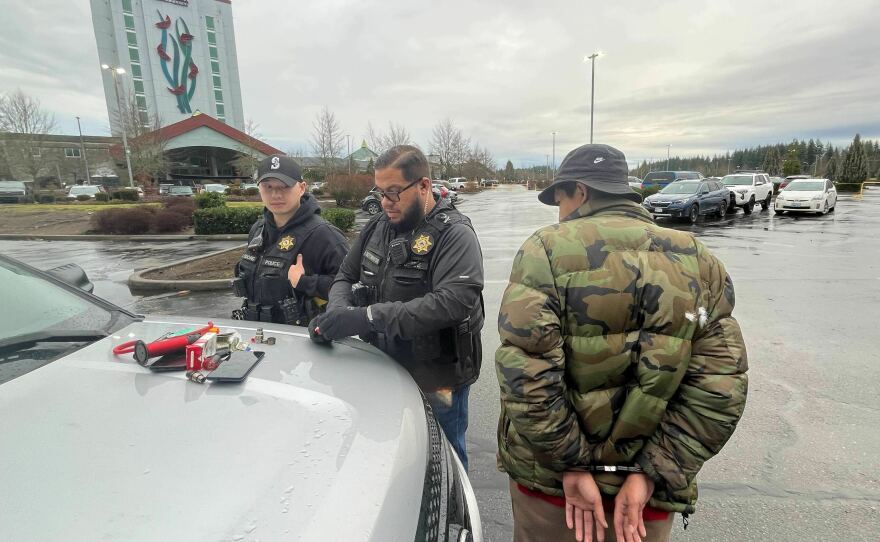As fentanyl addiction and overdose deaths ravage Native American communities, some tribal leaders want Native law enforcement to take drug enforcement more into their own hands.
"We can't wait anymore," Jamie Azure, chairman of the Turtle Mountain Band of Chippewa Indians, told the Senate Indian Affairs Committee in November. "We are very close to losing a generation to an opioid, to a synthetic drug."
Tribal leaders testified about an insufficient response by state and federal law enforcement to the drug traffickers who bring fentanyl onto reservations. Azure said his tribe was moving ahead with its own "tribal drug task force."
But tribal law enforcement is limited in what it can do. Because of the landmark 1978 Supreme Court ruling Oliphant v. Suquamish Indian Tribe, tribal courts are not allowed to prosecute non-American Indians for most crimes — including drug trafficking.
That distinction between Native and non-Native is an ever-present factor for tribal police on reservation land.

The Tulalip Tribes in Washington state, for instance, has a police department with a specialized team of narcotics detectives, who try to identify and interrupt the flow of fentanyl into their small reservation located between Interstate 5 and Puget Sound, north of Everett. When they detain or arrest someone on suspicion of drug crimes, a key question is "Are you tribal-enrolled?"
They asked that question recently of two men in a black Camaro in the parking lot of one of the Tulalip casinos. Visible inside the car was a hollowed-out pen, typically used to smoke fentanyl.
The men confirmed they were American Indian — enrolled in the Upper Skagit, another tribe in Washington. For purposes of tribal criminal jurisdiction, that's enough to make them subject to the Tulalip Tribes' drug laws.
"All right, so it is a crime to have drug paraphernalia, OK?" the officer says, making the arrest.
Just minutes earlier, Tulalip officers had encountered a white woman with a suspected meth pipe, and let her go. As a non-Native, she was subject to Washington state's more permissive drug paraphernalia law, and couldn't be charged.
Detective Haison Duong says the tribe's drug paraphernalia law gives Tulalip Police leverage over the two men because they're Native American.
He says they may be encouraged to opt for treatment, through the tribe's drug-diversion court system, called Wellness Court.
They might also be nudged into helping the police.
"Sometimes, let's say we get this gentleman and he wants to work off his charge and take us to his dealer, right?" Duong says.
Finding the dealers is the priority for the tribe. It recently made drug-dealing a felony — it used to be a misdemeanor — but only if the dealer is enrolled in a tribe. If a suspected dealer turns out to be non-Native, reservation police have to take the case to state or federal prosecutors, who may not give it the priority the tribe would.
"We are bearing the brunt of criminal activity without being able to address it," says Angelique EagleWoman, director of the Native American Law and Sovereignty Institute at Mitchell Hamline School of Law in St. Paul, Minn.
"We have to reach out to state and federal partners and hope that they devote resources. Hope they hear the call. Hope they understand the crisis. And it's very frustrating," she says.

The system doesn't have to work this way. In that 1978 ruling, the Supreme Court said Congress could choose to give tribal courts the authority to prosecute non-American Indians. And for certain crimes, it has.
In the 2013 reauthorization of the Violence Against Women Act, Congress created special tribal criminal jurisdiction, allowing tribes to prosecute non-Natives who commit domestic violence. The list of crimes was expanded in 2022 to include crimes against tribal-enrolled children, among others.
The Tulalip Tribes Court is one of the reservation courts exercising that new authority; just a few weeks ago, it prosecuted a non-Native woman and former school employee who had had sex with an underage member of the tribe. She pleaded guilty to "communications with a minor for immoral purposes," and the tribal court sentenced her to jail time.
The chief judge, Meredith Drent, a member of the Osage Nation of Oklahoma, says this kind of jurisdiction over non-Natives makes sense.
"When I go to Colorado, I may not know their laws but I know that I'm going to have to follow them, and they can prosecute me if I don't," she says. "And it's the same thing here. When you enter someone else's jurisdiction, you fall under their laws."
Further complicating matters for Tulalip authorities is the fact that most of the people living within reservation boundaries, roughtly two-thirds, are not Native.
" 'Tribal/non-tribal' is a distinction that doesn't really make sense if you're living in a reservation," says Brian Kilgore, a prosecutor for Tulalip Tribes. "That divides families in half. It cuts people, across the middle of the street. It doesn't make any sense at all if you're trying to do justice by community standards."
That was the rationale for allowing tribal courts to prosecute non-Natives for domestic violence crimes; now, they say it's time to extend that logic to non-Natives who live on reservations and victimize other residents with fentanyl.
At the Senate Indian Affairs Committee hearing in November, councilman Bryce Kirk of the Fort Peck Reservation in Montana asked Congress to "give us the criminal jurisdiction to be able to charge them in tribal court and to be able to hold them in our jails."
But the movement to increase tribal courts' legal powers faces powerful political headwinds. In Oklahoma, for instance, after the U.S. Supreme Court and a federal appeals court greatly expanded the state territory in which tribal courts have jurisdiction over tribal members, Oklahoma Gov. Kevin Stitt launched a pushback campaign called "One Oklahoma."
"In America, we expect that everyone follows the same set of rules, regardless of who you are or where you come from," Stitt says in a video posted to the campaign's site. "We need one, united Oklahoma. An Oklahoma where all men are created equal."
There have been moments of tension over expansions of tribal courts' jurisdiction. In December, a fight broke out between Muscogee Nation tribal police and the staff at the Okmulgee County jail. A jailer reportedly refused to book a drug crime suspect brought in by tribal police, leading to the altercation. The tribal court later charged the county jailer with battery against the tribal officer.
Some critics of expanded tribal jurisdiction don't mince words: They say they don't trust the Native courts.
"The Constitution does not apply on [the] reservation," says Lana Marcussen, the lawyer for the nonprofit arm of the Citizens Equal Rights Alliance, a group that opposes the current model of tribal sovereignty, especially in land-use cases.
Marcussen has written briefs in key federal cases involving tribal jurisdiction, and she says the tribal justice system is a potential threat to the civil rights of tribal members as well as non-Natives.
"I would say the majority of tribes try to be good to their members," Marcussen says. "But the fact is, if you cross that tribal government or you cross that police chief — boy, they know full well they don't have to give any of those rights.
CERA's opponents call the group "anti-Indian" and say this characterization of tribal courts is unfair, as they offer due process such as trial by juries selected from the community.
Ultimately, the decision to increase tribal jurisdiction over non-Indians is up to Congress, and Professor EagleWoman says congressional action usually requires a crisis. The last crisis, she says, was the public outcry over unpunished violence against indigenous women.
"That led to, 'Yes, tribes can prosecute non-Indians engaged in dating violence, engaged in domestic violence on tribal lands,' " she says. "We have the same thing happening now with the influx of fentanyl and other drugs on tribal lands."
Copyright 2025 NPR







